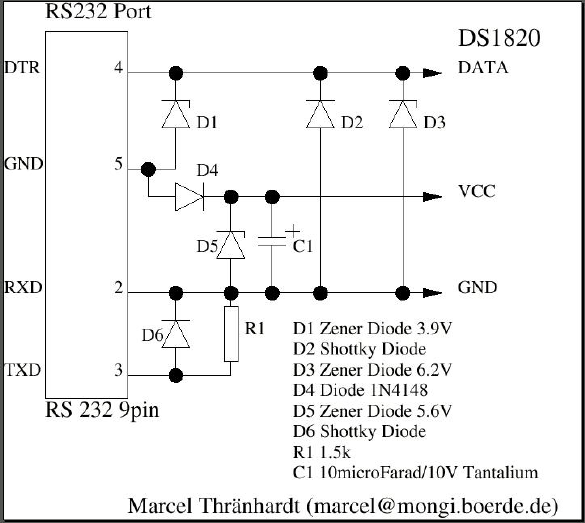because ippp0 sets a default route we change to ippp1:
mv /etc/isdn/device.ippp0 /etc/isdn/device.ippp1
mv /etc/isdn/ipppd.ippp0 /etc/isdn/ipppd.ippp1
/etc/isdn/device.ippp1 (remove '# REMOVE'):
LOCALMSN='XXXXX'
REMOTEMSN=
isdnctrl ihup ${device} on
isdnctrl secure ${device} off
/etc/isdn/ipppd.ippp1 (remove '# REMOVE'):
debug
name YYYYY
/etc/ppp/chap-secrets:
# client server secret IP addresses
YYYYY HOSTNAME PASSWORD ""
[ view entry ] ( 750 views ) | print article
sudo apt-get install vnc4-common vnc4
sudo vncpasswd /etc/vncpasswd
/etc/X11/xorg.conf:
Section "Module"
Load "vnc"
EndSection
Section "Screen"
Option "PasswordFile" "/etc/vncpasswd"
EndSection
[ view entry ] ( 809 views ) | print article
For me it is sufficient to have data written every 20 Minutes.
To enable this i use laptop-mode and set some values in /etc/sysctrl.conf:
vm.swappiness = 0
vm.laptop_mode = 1200
vm.dirty_writeback_centisecs = 120000
vm.dirty_expire_centisecs = 120000
vm.dirty_ratio = 40
vm.dirty_background_ratio = 1
[ view entry ] ( 866 views ) | print article
To bootstrap debian sid on a second harddisk do following
* create partitions / filesystems
cfdisk /dev/hdc
mkfs.ext2 /dev/hdc1
mount -o rw,suid,dev /dev/hdc1 /mnt
mkswap -f /dev/hdc2
swapon /dev/hdc2
* bootstrap (with a deb proxy like approx)
cdebootstrap -v sid /mnt http://proxy:9999/debian
install cdebootstrap from hardy if something went wrong
wget [mirror]cdebootstrap_0.4.4ubuntu1_i386.deb
dpkg --force-all -i cdebootstrap_0.4.4ubuntu1_i386.deb
* enter chroot
mount --bind /proc /mnt/proc/
mount --bind /dev /mnt/dev
chroot /mnt
export LANG=C
* install kernel and bootloader
apt-get install grub linux-image-2.6.24-1-486
cat /etc/kernel-img.conf<<EOF
# Kernel Image management overrides
# See kernel-img.conf(5) for details
do_symlinks = yes
relative_links = yes
do_bootloader = no
do_bootfloppy = no
do_initrd = yes
link_in_boot = no
postinst_hook = update-grub
postrm_hook = update-grub
EOF
* config bootloader
echo "/dev/hdc1 / ext2 rw 0 0" > /etc/mtab
grub-install /dev/hdc
update-grub
change in /boot/grub/menu.lst root=/dev/hdc1 with UUID
sed "s|root=/dev/hdc1|root=UUID=$(/lib/udev/vol_id --uuid /dev/hdc1)|" /boot/grub/menu.lst
* create /etc/fstab
echo "UUID=$(/lib/udev/vol_id --uuid /dev/hdc1) / auto defaults,noatime 0 1" > /etc/fstab
echo "UUID=$(/lib/udev/vol_id --uuid /dev/hdc2) none swap sw 0 0" >> /etc/fstab
* add a user
shadowconfig on
adduser USERNAME
* setup network, timezone
echo "nameserver NAMESERVERIP" > /etc/resolv.conf
echo HOSTNAME >/etc/hostname
cat > /etc/network/interfaces <<EOF
auto lo eth0
iface lo inet loopback
iface eth0 inet dhcp
EOF
* individual configs
tzselect
/etc/default/rcS:
TMPTIME=0
SULOGIN=no
DELAYLOGIN=no
UTC=yes
VERBOSE=no
FSCKFIX=yes
RAMRUN=yes
RAMLOCK=yes
/etc/default/syslogd:
SYSLOGD="-m 0"
* cleanup
apt-get clean
apt-get install deborphan
apt-get remove --purge $(deborphan)
* search for unused packages
dpkg -l | grep ^ii | less
* remove unused packages
apt-get remove --purge aptitude cdebootstrap-helper-diverts laptop-detect nano tasksel-data tasksel vim-common vim-tiny
[ view entry ] ( 9303 views ) | print article
I used following schematic

Additionally i connected three twisted pair wires with a 100 Ohm resistor. At the end of each wire a schottky diode reverse biased across the DS18S20 sensor against spikes is used.
At the moment i have 5 DS18S20 temperature sensors (inside, outside, heater back, heater, warmwater)
Initialising: digitemp -i -s /dev/ttyS0 -q -c /etc/digitemp.conf
Reading: digitemp -a -q -c /etc/digitemp.conf
Mar 16 12:44:06 Sensor 0 C: 20.94 F: 69.69
Mar 16 12:44:07 Sensor 1 C: 13.75 F: 56.75
Mar 16 12:44:09 Sensor 2 C: 28.69 F: 83.64
Mar 16 12:44:10 Sensor 3 C: 31.94 F: 89.49
Mar 16 12:44:11 Sensor 4 C: 48.75 F: 119.75
/etc/collectd.conf:
LoadPlugin exec
<Plugin exec> Exec "nobody:dialout" "/usr/bin/digitemp_DS9097" "-n0" "-d10" "-a" "-q" "-c/etc/digitemprc" "-oPUTVAL home/temp/temperature-%s interval=10 %N:%.2C"
</Plugin>
I had to make a patch for collectd that the exec plugin runs with user nobody and group dialout. Because user nobody's group is not dialout "setgroups" have to be called (add user nobody to /etc/groups dialout is only used if initgroups is called).
Also for digitemp i made a patch because i got sometimes 85 degrees (error condition) which are not correctly handled by digitemp:
Hi!
I discovered the use of wrong indexes:
These is your Indextable:
Temperature = scratchpad[1]
Sign = scratchpad[2]
TH = scratchpad[3]
TL = scratchpad[4]
Count Remain = scratchpad[7]
Count Per C = scratchpad[8]
CRC = scratchpad[9]
1. glitch condition
COUNT_PER_C is Index 8 and COUNT_REMAIN is Index 7
- if( (scratchpad[7] - scratchpad[6]) == 1 )
+ if( (scratchpad[8] - scratchpad[7]) == 1 )
2. Error Condition (85 Degrees)
- if( (scratchpad[4]==0xAA) &&
- (scratchpad[3]==0x00) &&
- (scratchpad[7]==0x0C) &&
- (scratchpad[8]==0x10)
+ if( (scratchpad[1]==0xAA) &&
+ (scratchpad[2]==0x00) &&
+ (scratchpad[7]==0x0C) &&
+ (scratchpad[8]==0x10) )
Also i think an Error Condition (85 Degrees) should be handled like a
CRC Error.
[ view entry ] ( 816 views ) | print article
<<First <Back | 14 | 15 | 16 | 17 | 18 | 19 | 20 | 21 | 22 | 23 | Next> Last>>